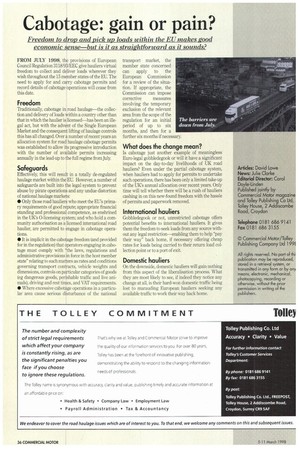Cabotage: gain or pain?
Page 38

If you've noticed an error in this article please click here to report it so we can fix it.
Freedom to drop and pick up loads within the EU makes good economic sense—but is it as straightforward as it sounds?
FROM JULY 1998, the provisions of European Council Regulation 3118/93/EEC give hauliers virtual freedom to collect and deliver loads wherever they wish throughout the 15 member states of the Eli. The need to apply for and carry cabotage permits and record details of cabotage operations will cease from this date.
Freedom
Traditionally, cabotage in road haulage—the collection and delivery of loads within a country other than that in which the haulier is licensed—has been an illegal act, but with the advent of the Single European Market and the consequent lifting of haulage controls this has all changed. Over a number of recent years an allocation system for road haulage cabotage permits was established to allow its progressive introduction with the number of available permits increasing annually in the lead-up to the full regime from July
Safeguards
Effectively, this will result in a totally de-regulated haulage market within the EU. However, a number of safeguards are built into the legal system to prevent abuse by pirate operations and any undue distortion of national haulage markets: • Only those road hauliers who meet the RA primary requirements of good repute; appropriate financial standing and professional competence, as enshrined in the UK's 0-licensing system; and who hold a community authorisation as a licensed international road haulier, are permitted to engage in cabotage operations.
• It is implicit in the cabotage freedom (and provided for in the regulation) that operators engaging in cabotage must comply with "the laws, regulations and administrative provisions in force in the host member state" relating to such matters as rates and conditions governing transport contracts, vehicle weights and dimensions, controls on particular categories of goods (eg dangerous goods, perishable traffic and live animals), driving and rest times, and VAT requirements.
• Where excessive cabotage operations in a particular area cause serious disturbance of the national transport market, the member state concerned can apply to the European Commission for a review of the situation. If appropriate, the Commission can impose
corrective measures involving the temporary exclusion of the relevant area from the scope of the regulation for an initial period of up to six months, and then for a further six months if necessary.
What does the change mean?
Is cabotage just another example of meaningless Euro-legal gobbledegook or will it have a significant impact on the day-to-day livelihoods of UK road hauliers? Even under the partial cabotage system, when hauliers had to apply for permits to undertake such operations, there has been only a limited take-up of the UK's annual allocation over recent years. Only time will tell whether there will be a rush of hauliers cashing in on this new-found freedom with the hassle of permits and paperwork removed.
International hauliers
Gobbledegook or not, unrestricted cabotage offers potential benefits to international hauliers. It gives them the freedom to seek loads from any source without any legal restriction—enabling them to help "pay their way" back home, if necessary offering cheap rates for loads being carried to their return load collection point or to a port of exit.
Domestic hauliers
On the downside, domestic hauliers will gain nothing from this aspect of the liberalisation process. What they are most likely to see, if indeed they notice any change at all, is their hard-won domestic traffic being lost to marauding European hauliers seeking any available traffic to work their way back home.
Articles: David Lowe News: _Vie Clarke Editorial Director: Carol Doyle-Linden
Published jointly by Commercial Motor magazine and Tolley Publishing Co Ltd, Todey House, 2 Addiscombe Road, Croydon
Telephone 01 81 686 9141 Fax 0181 686 3155
C) Commercial Motor/Tolley Publishing Company Ltd 19W
All rights reserved. No part of tfi publication may be reproduced, stored in a retrieval system, or transmitted in any form or by any means, electronic, mechanical, photocopying, recording or otherwise, without the prior permission in writing of the publishers.




































































































































